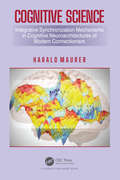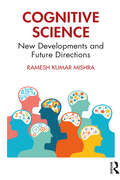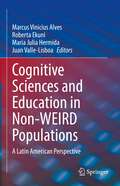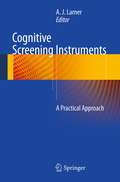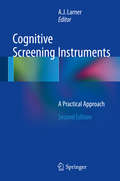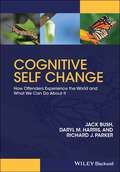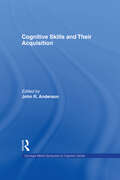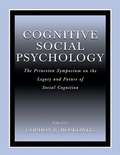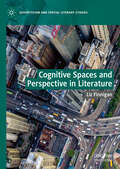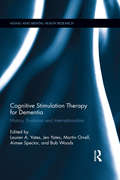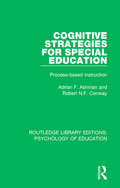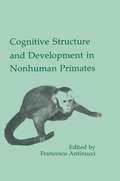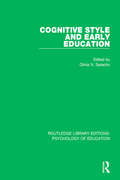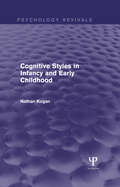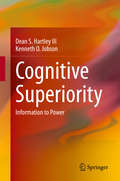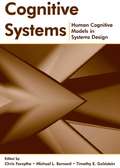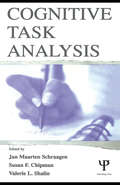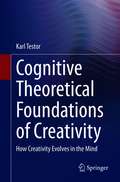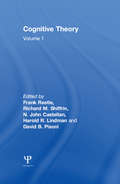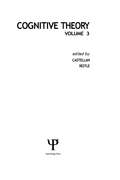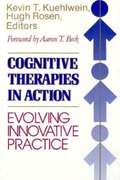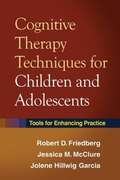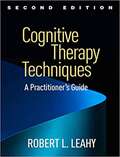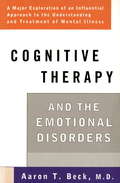- Table View
- List View
Cognitive Science: Integrative Synchronization Mechanisms in Cognitive Neuroarchitectures of Modern Connectionism
by Harald MaurerThe Mind and Brain are usually considered as one and the same nonlinear, complex dynamical system, in which information processing can be described with vector and tensor transformations and with attractors in multidimensional state spaces. Thus, an internal neurocognitive representation concept consists of a dynamical process which filters out statistical prototypes from the sensorial information in terms of coherent and adaptive n-dimensional vector fields. These prototypes serve as a basis for dynamic, probabilistic predictions or probabilistic hypotheses on prospective new data (see the recently introduced approach of "predictive coding" in neurophilosophy). Furthermore, the phenomenon of sensory and language cognition would thus be based on a multitude of self-regulatory complex dynamics of synchronous self-organization mechanisms, in other words, an emergent "flux equilibrium process" ("steady state") of the total collective and coherent neural activity resulting from the oscillatory actions of neuronal assemblies. In perception it is shown how sensory object informations, like the object color or the object form, can be dynamically related together or can be integrated to a neurally based representation of this perceptual object by means of a synchronization mechanism ("feature binding"). In language processing it is shown how semantic concepts and syntactic roles can be dynamically related together or can be integrated to neurally based systematic and compositional connectionist representations by means of a synchronization mechanism ("variable binding") solving the Fodor-Pylyshyn-Challenge. Since the systemtheoretical connectionism has succeeded in modeling the sensory objects in perception as well as systematic and compositional representations in language processing with this vector- and oscillation-based representation format, a new, convincing theory of neurocognition has been developed, which bridges the neuronal and the cognitive analysis level. The book describes how elementary neuronal information is combined in perception and language, so it becomes clear how the brain processes this information to enable basic cognitive performance of the humans.
Cognitive Science: New Developments and Future Directions
by Ramesh Kumar MishraThis volume provides an overview of cognitive science and critically assesses areas within the topic that are evolving rapidly. Using multidisciplinary studies and rich empirical literature, discussions, and demonstrations, this book: • Discusses the evolution of cognition with reference to material records and the use of brain imaging • Highlights emerging domains and novel themes within cognitive science such as transgender cognition, space cognition, cross-cultural cognition, futuristic artificial intelligence, social cognition and moral cognition • Reflects on the status of cognition research in these emerging areas and critically evaluates their current progress • Explores data both from behavioural and neuroimaging research literature, and sheds light on the potential effects of technological growth and changing habits on attention and cognitive abilities of humans • Examines the effects of religious and meditative practices on its core cognitive science components • Speculates research domains that would gain importance in the next few decades in cognitive science research Finding commonalities in theoretical frameworks and models in upcoming areas in cognition research, this comprehensive study will be of interest to students, researchers and teachers of cognitive psychology, cognitive science, neuroscience, medical science and computer science. It will also be helpful for academicians, psychologists, neuroscientists, mental health professionals, medical professionals, counsellors and those looking for an alternate perspective on the topic.
Cognitive Sciences and Education in Non-WEIRD Populations: A Latin American Perspective
by Marcus Vinicius Alves Roberta Ekuni Maria Julia Hermida Juan Valle-LisboaThis book aims to present theoretical and practical innovations in the cognitive sciences and education fields focusing on studies and research conducted with non-WEIRD (i.e., western, educated, industrialized, rich and democratic) populations, especially from Latin America. Cognitive sciences and neuroscience have increased exponentially their knowledge in the last three decades, and today there is a corpus of knowledge about our central nervous system and its functioning that (adequately understood) has promising contributions for the educational field. Most of this knowledge, however, comes from central countries (North America, Europe) and is based on studies conducted on what has been called WEIRD populations. Much less is known about how the integration of cognitive sciences and neuroscience could impact education in non-WEIRD populations, which represent the great majority of the world’s population and have quite diverse cultural and social characteristics. So, the main aim of this book is to present a non-WEIRD scientific approach to problems in the cognitive sciences, neuroscience and education fields.Research presented in this contributed volume takes advantage of the diverse populations that characterize developing countries to explore how underrepresented populations learn, what works and what does not for cognitive science and education not only for the developing world, but also for understanding diversity in the whole world. Departing from this focus on diversity, chapters in this book present studies on theories, beliefs and misconceptions about the relationship between cognitive sciences and education; child and adolescent cognitive development; mathematics and language academic performance; and cognitive interventions to improve educational practice. Cognitive Sciences and Education in Non-WEIRD Populations: A Latin American Perspective will be a useful resource for both cognitive scientists and educational researchers interested in developing a more culturally sensitive approach to basic and applied research on cognitive sciences of education.
Cognitive Screening Instruments: A Practical Approach
by A. J. LarnerCognitive Screening Instruments: A Practical Approach provides a practical and structured overview of some of the most commonly used and easily available cognitive screening instruments applicable in the outpatient clinic and bedside setting. Dementia and cognitive disorders are now recognised as an increasing public health problem, both in terms of patient numbers and cost, as populations age throughout the world. Despite this, many patients with dementia never receive a formal diagnosis, with implications for their appropriate care and management. Diagnostic tests which identify cases of dementia therefore have an important role. Expert authors from around the world equip the reader of Cognitive Screening Instruments: A Practical Approach with clear instructions on the usage of each screening instrument, its strengths and weaknesses, the time required for administration, and rules on scoring, such as how to correct for variations in the patient's age or education, and suggested cut-off scores. Cognitive Screening Instruments: A Practical Approach is a handy, illustrated guide and a valuable diagnostic aid for practitioners working closely with patients with dementia and mild cognitive impairment. This volume will be of use both to clinicians and to professionals in disciplines allied to medicine who are called upon to assess patients with possible cognitive disorders, including neurologists, old age psychiatrists, neuropsychologists, primary care physicians, dementia support workers, and members of memory assessment teams.
Cognitive Screening Instruments: A Practical Approach
by A. J. LarnerCognitive Screening Instruments: A Practical Approach provides a practical and structured overview of some of the most commonly used and easily available cognitive screening instruments applicable in the outpatient clinic and bedside setting. Dementia and cognitive disorders are now recognised as an increasing public health problem, both in terms of patient numbers and cost, as populations age throughout the world. Despite this, many patients with dementia never receive a formal diagnosis, with implications for their appropriate care and management. Diagnostic tests which identify cases of dementia therefore have an important role. Expert authors from around the world equip the reader of Cognitive Screening Instruments: A Practical Approach with clear instructions on the usage of each screening instrument, its strengths and weaknesses, the time required for administration, and rules on scoring, such as how to correct for variations in the patient's age or education, and suggested cut-off scores. Cognitive Screening Instruments: A Practical Approach is a handy, illustrated guide and a valuable diagnostic aid for practitioners working closely with patients with dementia and mild cognitive impairment. This volume will be of use both to clinicians and to professionals in disciplines allied to medicine who are called upon to assess patients with possible cognitive disorders, including neurologists, old age psychiatrists, neuropsychologists, primary care physicians, dementia support workers, and members of memory assessment teams.
Cognitive Self Change: How Offenders Experience the World and What We Can Do About It
by Richard J. Parker Jack Bush Daryl M. HarrisThis book draws on the latest literature to highlight a fundamental challenge in offender rehabilitation; it questions the ability of contemporary approaches to address this challenge, and proposes an alternative strategy of criminal justice that integrates control, opportunity, and autonomy. * Provides an up to date review of the links between cognition and criminal behavior, as well as treatment and rehabilitation * Engages directly with the antisocial underpinnings of criminal behavior, a major impediment to treatment and rehabilitation * Outlines a clear strategy for communicating with offenders which is firmly rooted in the "What Works" literature, is evidence-based, and provides a way of engaging even the most antisocial of offenders by presenting them with meaningful opportunities to change * Offers hands-on instructions based upon the real-life tactics and presentation of the high-risk offender
Cognitive Skills and Their Acquisition (Carnegie Mellon Symposia on Cognition Series)
by John R. AndersonFirst published in 1981. Routledge is an imprint of Taylor & Francis, an informa company.
Cognitive Social Psychology: The Princeton Symposium on the Legacy and Future of Social Cognition
by Gordon B. MoskowitzA comprehensive overview of the mechanisms involved in how cognitive processes determine thought and behavior toward the social world, Cognitive Social Psychology: *examines cognition as a motivated process wherein cognition and motivation are seen as intertwined; * reviews the latest research on stereotyping, prejudice, and the ability to control these phenomena--invaluable information to managers who need to prevent against bias in the workplace; and *provides a current analysis of classic problems/issues in social psychology, such as cognitive dissonance, the fundamental attribution error, social identity, stereotyping, social comparison, heuristic processing, the self-concept, assimilation and contrast effects, and goal pursuit. Intended for psychology and management students, as well as social, cognitive, and industrial/organizational psychologists in both academic and applied settings. This new book is also an ideal text for courses in social cognition due to its cohesive structure.
Cognitive Spaces and Perspective in Literature (Geocriticism and Spatial Literary Studies)
by Liz FinniganThis book brings an original perspective to literary theory and criticism by using insights drawn from visual cognition and neuroscience. Employing recent findings in neuroscience to explain consistent patterns in the representation of space in literature, Finnigan explores how these patterns exploit readers’ power to imagine themselves in different times and places and identifies the literary power of deviating from these patterns. While focusing on Victorian, Modernist and Postmodernist texts, Finnigan brings a new critical framework that can applied in other literary contexts through neuroscience and psychological theory.
Cognitive Stimulation Therapy for Dementia: History, Evolution and Internationalism (Aging and Mental Health Research)
by Bob Woods Aimee Spector Lauren A. Yates Jennifer Yates Martin OrrellCognitive Stimulation Therapy (CST) has made a huge global, clinical impact since its inception, and this landmark book is the first to draw all the published research together in one place. Edited by experts in the intervention, including members of the workgroup who initially developed the therapy, Cognitive Stimulation Therapy for Dementia features contributions from authors across the globe, providing a broad overview of the entire research programme. The book demonstrates how CST can significantly improve cognition and quality of life for people with dementia, and offers insight on the theory and mechanisms of change, as well as discussion of the practical implementation of CST in a range of clinical settings. Drawing from several research studies, the book also includes a section on culturally adapting and translating CST, with case studies from countries such as Japan, New Zealand and Sub-Saharan Africa. Cognitive Stimulation Therapy for Dementia will be essential reading for academics, researchers and postgraduate students involved in the study of dementia, gerontology and cognitive rehabilitation. It will also be of interest to health professionals, including psychologists, psychiatrists, occupational therapists, nurses and social workers.
Cognitive Strategies for Special Education: Process-Based Instruction (Routledge Library Editions: Psychology of Education)
by Adrian F. Ashman Robert N.F. ConwayResearch on training programs for students with learning difficulties has usually focused on the development of social and behavioural skills and the acquisition of cognitive interventions and procedures. Originally published in 1989, this book attempts to apply the methods validated by research and synthesize the discoveries made in the psychological laboratory for the benefit of teachers in regular classrooms. It reviews the literature relevant to special needs teaching and traces the development of cognitive research as it applies to education. The authors propose a specific and practical teaching strategy which has been successfully used by those working with students with special needs. Starting from the basic belief that education is an interactive process between the participants, the authors have emphasised the role and responsibility both of the teacher and the learner. Their book should be of value to researchers and practitioners in psychology and special education.
Cognitive Structures and Development in Nonhuman Primates: Theory, Methods, And Applications (Comparative Cognition and Neuroscience Series)
by Adedeji B. BadiruThe contributors to this volume present research concerning the cognitive structures and development of nonhuman primates from a cognitive psychological perspective. The authors and researchers come to this project from the study of humans and apply their knowledge to research on nonhumans. For professional, researchers, and students in cognitive, developmental, and experimental psychology.
Cognitive Style in Early Education (Routledge Library Editions: Psychology of Education)
by Olivia N. SarachoCognitive style, a psychological construct, characterizes individual differences in styles of perceiving, remembering, thinking and judging. Originally published in 1990, this volume explores important findings emerging from contemporary research on cognitive style in young children and the implications for classroom practice at the time. Suggestions are provided for using knowledge of cognitive style in classroom settings to match learning tasks to cognitive style and to develop cognitive flexibility. Educators can use knowledge of young children’s and teachers’ cognitive styles to improve the quality of education and educational opportunities for all children.
Cognitive Styles in Infancy and Early Childhood (Psychology Revivals)
by Nathan KoganOriginally published in 1976, here is a comprehensive account of the role of cognitive styles in early childhood. The author considers the possible precursors of these styles in infancy, and offers a new classification scheme that helps to clarify the relation of cognitive styles to ability and intelligence. In separate chapters, field independence–dependence, reflection–impulsivity, breadth of categorization, and styles of conceptualization are examined, along with a chapter on the interrelationships between these styles. The final chapter integrates and critically summarizes the significance of cognitive styles during the early years of life. Throughout the volume the author attempts to link cognitive styles with other theoretical constructs (for example, unilinear versus multilinear models of development, Inhelder and Piaget’s studies of classification stages), and finally, the author advances a set of seven conclusions to reflect the contemporary state of knowledge in regard to the character and function of cognitive styles during the early years of life. This volume provides information about the beginnings of cognitive styles in infancy and the course of their development in preschool years. Research is examined both from the viewpoint of developmental change and individual differences among children. The role of sex differences in cognitive styles is thoroughly examined, and, contrary to earlier claims of ‘no difference’, the author convincingly demonstrates that females manifest clear-cut superiority across a wide band of cognitive functions during the pre-school years.
Cognitive Superiority: Information to Power
by Dean S. Hartley III Kenneth O. JobsonIn a world of accelerating unending change, perpetual surveillance, and increasing connectivity, conflict has become ever more complex. Wars are no longer limited to the traditional military conflict domains—land, sea, air; even space and cyber space. The new battlefield will be the cognitive domain and the new conflict a larger contest for power; a contest for cognitive superiority. Written by experts in military operations research and neuropsychology, this book introduces the concept of cognitive superiority and provides the keys to succeeding within a complex matrix where the only rules are the laws of physics, access to information, and the boundaries of cognition.The book describes the adversarial environment and how it interacts with the ongoing, accelerating change that we are experiencing, irrespective of adversaries. It talks about the ascendant power of information access, pervasive surveillance, personalized persuasion, and emerging new forms of cognition. It profiles salient technologies and science, including persuasion science, artificial intelligence and machine learning (AI/ML), surveillance technologies, complex adaptive systems, network science, directed human modification, and biosecurity. Readers will learn about human and machine cognition, what makes it tick, and why and how we and our technologies are vulnerable.Following in the tradition of Sun-Tsu and von Clausewitz, this book writes a new chapter in the study of warfare and strategy. It is written for those who lead, aspire to leadership, and those who teach or persuade, especially in the fields of political science, military science, computer science, and business.
Cognitive Systems: Human Cognitive Models in Systems Design (Human Factors And Ergonomics Ser.)
by Chris Forsythe Michael L. Bernard Timothy E. GoldsmithThe leading thinkers from the cognitive science tradition participated in a workshop sponsored by Sandia National Laboratories in July of 2003 to discuss progress in building their models. The goal was to summarize the theoretical and empirical bases for cognitive systems and to present exemplary developments in the field. Following the workshop, a great deal of planning went into the creation of this book. Eleven of the twenty-six presenters were asked to contribute chapters, and four chapters are the product of the breakout sessions in which critical topics were discussed among the participants. An introductory chapter provides the context for this compilation.Cognitive Systems thus presents a unique merger of cognitive modeling and intelligent systems, and attempts to overcome many of the problems inherent in current expert systems. It will be of interest to researchers and students in the fields of cognitive science, computational modeling, intelligent systems, artificial intelligence, and human-computer interaction.
Cognitive Task Analysis (Expertise: Research and Applications Series)
by Jan Maarten Schraagen Susan F. Chipman Valerie L. ShalinCognitive task analysis is a broad area consisting of tools and techniques for describing the knowledge and strategies required for task performance. Cognitive task analysis has implications for the development of expert systems, training and instructional design, expert decision making and policymaking. It has been applied in a wide range of settings, with different purposes, for instance: specifying user requirements in system design or specifying training requirements in training needs analysis. The topics to be covered by this work include: general approaches to cognitive task analysis, system design, instruction, and cognitive task analysis for teams. The work settings to which the tools and techniques described in this work have been applied include: 911 dispatching, faultfinding on board naval ships, design aircraft, and various support systems. The editors' goal in this book is to present in a single source a comprehensive, in-depth introduction to the field of cognitive task analysis. They have attempted to include as many examples as possible in the book, making it highly suitable for those wishing to undertake a cognitive task analysis themselves. The book also contains a historical introduction to the field and an annotated bibliography, making it an excellent guide to additional resources.
Cognitive Theoretical Foundations of Creativity: How Creativity Evolves in the Mind
by Karl TestorHow does creativity evolve in mind? This question leads a journey through neuroanatomical understanding and cognitive models. It thereby helps to figure out new approaches in decoding the process of creativity. These “aspects of the new” provide better understanding and constitute future research and insight of cognitive activities and creativity.
Cognitive Theory: Volume 1: Cognitive Theory
by F. RestleFirst published in 1982. This book contains the content of the Indiana Conference of 1974. This Conference has met for each of the last seven years. At one time it was known as the Midwestern Mathematical Psychology Meeting, but as interest drifted toward more experimental and theoretical, but less purely mathematical work, the title became the Indiana Theoretical and Cognitive Psychology Meetings. The contributors to this Conference were requested to emphasize the relatively broad theoretical significance of their work, to incorporate the work of others, and if they were willing, to speculate about future developments
Cognitive Theory: Volume 3 (Cognitive Theory Ser.)
by Stephen W. Link N. John Castellan Jr. Frank Restle Michael H. Birnbaum George R. PottsFirst published in 1978. Routledge is an imprint of Taylor & Francis, an informa company.
Cognitive Therapies in Action: Evolving Innovative Practice
by Kevin T. Kuehlwein Hugh RosenOffers an overview of the broad range of cognitive therapeutic approaches, including state-of-the-art innovations. The authors present extensive case examples to demonstrate how to apply these therapy models to a range of clients, including those suffering from psychoses and personality disorders.
Cognitive Therapy For Personality Disorders: A Schema-focused Approach, 3rd Edition
by Jeffrey E. YoungAn excellent guide to treating the most difficult cases in your practice: personality disorders and other chronic, self-defeating problems. The author describes how he adapted traditional cognitive therapy techniques to more effectively treat patients with narcissistic, borderline, passive-aggressive, dependent, and other personality disorders, as well as chronic dysthymic and anxious patients. Contains rationale, theory, practical applications, and active cognitive behavioral techniques. Presents an extended case example, and updated versions of the Young Schema Questionnaire, a Client's Guide to this approach, and schema listings.
Cognitive Therapy Techniques for Children and Adolescents
by Jessica Mcclure Robert FriedbergProviding a wealth of practical interventions and activities--all organized within a state-of-the-art modular framework--this invaluable book helps child clinicians expand their intervention toolkits. Building on the bestselling Clinical Practice of Cognitive Therapy with Children and Adolescents, which addresses the basics of treatment, Friedberg et. al., in their latest volume, provide additional effective ways for engaging hard-to-reach clients, addressing challenging problems, and targeting particular cognitive and behavioral skills. Fun and productive games, crafts, and other activities are described in step-by-step detail. Special features include over 30 reproducible forms and handouts, which book buyers can also download and print from Guilford's website.
Cognitive Therapy Techniques: A Practitioner's Guide
by Robert L. LeahyThis indispensable book has given many tens of thousands of practitioners a wealth of evidence-based tools for maximizing the power of cognitive therapy and tailoring it to individual clients. <P><P>Leading authority Robert L. Leahy describes ways to help clients identify and modify problematic thoughts, core beliefs, and patterns of worry, self-criticism, and approval-seeking; evaluate personal schemas; cope with painful emotions; and take action to achieve their goals. <P><P>Each technique includes vivid case examples and sample dialogues. Featuring 123 reproducible forms, the book has a large-size format for easy photocopying; purchasers also get access to a Web page where they can download and print the reproducible materials.
Cognitive Therapy and the Emotional Disorders (Pelican Ser.)
by Aaron T. BeckBeck describes both theory and therapeutic techniques for anxiety neuroses, depressions, obsessions, phobias, and psychosomatic disorders and demonstrates the wide range of applicability of the cognitive approach
